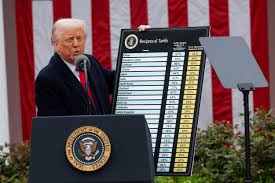American retreat : On Trump’s turn to protectionism.
The U.S. risks ceding its position as a global economic powerhouse.
What United States President Donald Trump did to global trade on April 2, 2025 in Washington closely mirrors a disruptive precedent set by President Richard Nixon in 1971. On August 15, Nixon stunned the world by announcing the “temporary suspension” of the U.S. dollar’s convertibility into gold. This effectively dismantled the Bretton Woods framework that was worked out quite unilaterally in 1944, which led to the setting up of the World Bank and the International Monetary Fund, and provided an anchor for global currency stability — an avenue to address balance of payments crises, and to finance the reconstruction efforts of former colonial powers. Though announced as a temporary move, it became permanent and upended the global financial system, as nations reckoned with a new era of financial market volatility. Similarly, Mr. Trump’s reciprocal tariffs have instantly ushered in global economic uncertainty, the full extent of which will be felt in the months and the years ahead. By unilaterally altering trade relationships, he has disrupted the very system of interconnected global commerce that the U.S. helped build in the post-war era.
The international reaction has been one of shock and concern. The U.S. is the world’s largest importer of manufactured goods, accounting for about 13% of global imports in 2023. The new tariffs will reroute supply chains and force countries to diversify their export strategies. In the immediate term, the cost of imports will rise for American consumers, leading to reduced demand. The ripple effects will be global, causing production slowdowns as exporters scramble to find alternative markets. Economies such as China, Japan, India and the European Union are likely to experience a temporary decline in economic growth. Yet, unlike in the Nixon era, the U.S. today holds a diminished position in global trade. In the 1970s, it was the world’s dominant trader, with an estimated 13%-15% share of global trade. China’s presence was negligible at the time, accounting for less than 1%. Today, China commands the largest share of global trade, at around 14%, while the U.S. has slipped to roughly 10%. The international community also accepted the dollar’s supremacy in the 1970s because of America’s overwhelming economic and technological dominance. Now, although the dollar remains the preferred reserve currency, the centre of economic gravity has shifted. The world’s leading exporters of advanced technologies are now China and other Asian powers, including South Korea, Japan, and Taiwan. Thus, Mr. Trump’s turn to protectionism — an attempt to regain American economic dominance — may well hasten the country’s retreat from its hegemonic position.
